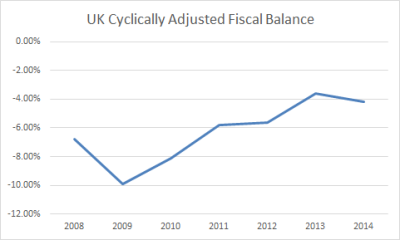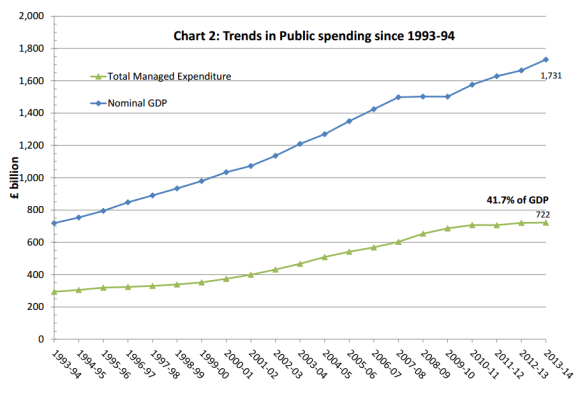Back in late 2012 there were a number of Keynesian economists who were very concerned about the US budget deficit and the potential negative impact of its shrinkage in the face of a weak economy. I was very critical of this view saying that austerity wasn’t necessarily going to hurt the US economy. In fact, I said that calling that “austerity” was a bit absurd. After all, US government spending was still very high in historical terms and still growing annually. In addition, the deficit was still growing at a healthy clip. There really wasn’t anything all that austere about what was going on back in 2013 or 2014 and the people who said the shrinking deficit would lead to recession were wrong.
In a new Financial Times op-ed I see that Niall Ferguson has used the space to claim that Keynesian economics is bunk and that the UK election proves that the austerity in the UK has been working well enough to disprove Keynesian claims about the impact of a shrinking deficit. He’s very critical of Paul Krugman just as I was back in 2013. And we have the same exact problem here that we did in the USA in 2012 – the UK hasn’t really implemented any meaningful austerity. Here is the UK’s cyclically adjusted fiscal balance (which corrects for automatic stabilizers):
You’ll notice that, despite a decline in the deficit, it’s still quite negative at 4%. And if we look at total public spending and public spending as a % of GDP we see a similar lack of austerity:
To me, it seems a bit unfair to characterize this situation as substantially “austere”. After all, a deficit is a deficit from the perspective of a fiscal conservative like Niall Ferguson. He’s essentially cheering on continual increases in public debt just because the amount of new debt is shrinking as a percentage of GDP each year. That’s like the obese person who gains 20 pounds in 2013, then implements an “austerity” measure where he’ll only gain 10 pounds in 2014. That’s not weight loss. It’s just a reduction in the rate of weight gain. Can you really claim you’re on a diet when you’re still moving in the wrong direction by any reasonable measure?
Regardless, I don’t know if I’d call the UK’s situation “austerity”. And I certainly don’t think it says anything about Keynesian economics or really anything. It more likely just goes to show that, as the economy heals from a deep crisis, the private sector more than handily offsets most of the negative impacts of the government. But in the eyes of many economists it’s all about what the government can do at any time. The idea that the private sector steers the economic ship often seems to take a backseat to policy theorizing. And this looks like a good case of precisely that.
Mr. Roche is the Founder and Chief Investment Officer of Discipline Funds.Discipline Funds is a low fee financial advisory firm with a focus on helping people be more disciplined with their finances.
He is also the author of Pragmatic Capitalism: What Every Investor Needs to Understand About Money and Finance, Understanding the Modern Monetary System and Understanding Modern Portfolio Construction.


